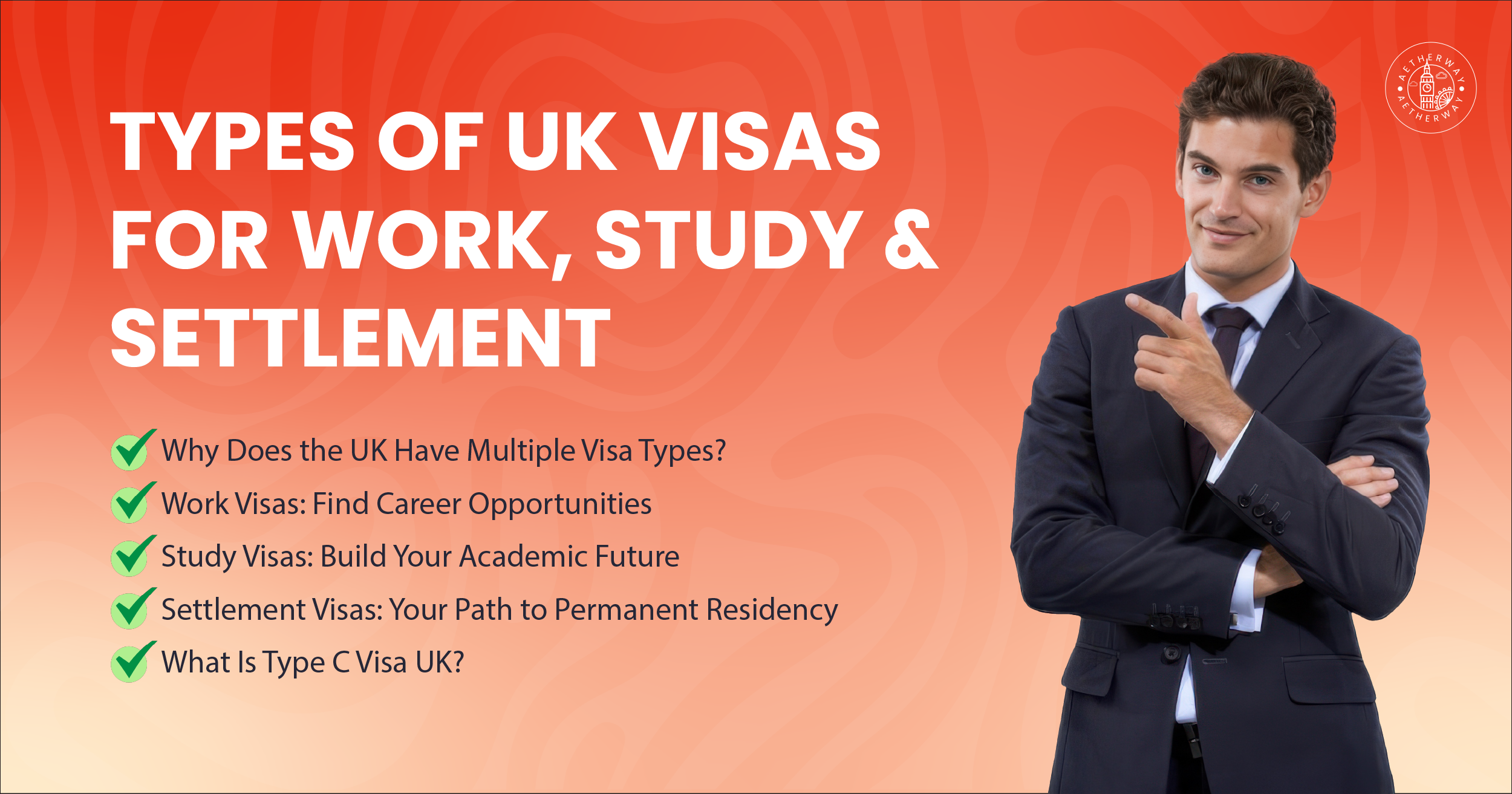
Types of UK Visas for Work, Study & Settlement
The United Kingdom remains one of the most sought-after destinations for students, professionals, and individuals seeking long-term settlement. With its world-class universities, robust economy, and high quality of life, the UK attracts millions every year. But before making a move, it’s essential to understand the types of UK visas available and which one suits your purpose best. Whether you’re coming to work, study, or settle permanently, understanding your visa options enables you to prepare effectively and avoid legal complications.
We’ll see the various UK visa categories for work, study, and settlement, and their requirements and qualifications in this guide. We’ll also brush against important subcategories, such as the type of visa for short stays in the UK.
Why Does the UK Have Multiple Visa Types?
UK immigration regulations are designed to fulfil specific goals, like short-term visits, skilled migration, higher studies, or reunions with family. Every visa has conditions, validity, and benefits. Depending on your purpose, staying period, job, and qualifications, the visa you apply for varies. The UK visa types are categorised in three broad groups: Work Visas, Study Visas, and Settlement Visas. Let’s discuss them at length.
Work Visas: Find Career Opportunities
If you are going to the UK to work, there are various visa classes that are specifically designed for professionals, skilled individuals, and business people. These are the types of visas in the UK for work:
1. Skilled Worker Visa
This is the most popular work visa pathway for individuals with UK job offers. You need to be sponsored by a qualified UK employer and have a certain salary and skill level.
Eligibility: Approved job offer from an employer, minimum salary requirement, and English language proficiency.
Validity: Up to 5 years, renewable.
Path to Settlement: Yes, after 5 years.
2. Global Talent Visa
For prospective leaders or leaders in disciplines such as science, digital technologies, arts, and academia. No job offer is needed for this visa.
Eligibility: Letter of recommendation from a recognised UK organisation.
Validity: 5 years.
Path to Settlement: Yes, quicker pathway (3 years for leaders).
3. Health and Care Worker Visa
A specialist subcategory of the Skilled Worker visa for health professionals such as doctors, nurses, and care workers.
Eligibility: Grant by the NHS or qualifying social care providers.
Benefits: Reduced application charges, excluded from Immigration Health Surcharge.
4. Graduate Trainee Visa (Global Business Mobility)
For staff of international firms relocating to a UK branch for training.
Eligibility: Spend 3–12 months working for the firm abroad, and be on a formal graduate training scheme.
These options under types of visa in the UK for work allow flexibility for professionals, ensuring a talent-driven immigration system.
Study Visas: Build Your Academic Future
The UK is home to some of the world’s best universities and educational institutions. If your purpose is academic, here are the main types of UK visas for students:
1. Student Visa
Formerly called the Tier 4 (General) Student Visa, this is for students aged 16 years or older studying higher education in the UK.
Eligibility: Sponsorship by a recognised student sponsor, adequate funds, and English language ability.
Validity: Length of course + 4 months.
Work Rights: Only limited part-time work permitted.
2. Child Student Visa
For children between the ages of 4–17 studying at independent schools in the UK.
Eligibility: Admission to an independent school, sponsorship, parental permission.
3. Short-term Study Visa
For those undertaking English language courses of 6–11 months’ duration.
Eligibility: Evidence of enrollment, financial provision, and commitment to leave after study.
After studying, students may transfer to employment visas such as the Graduate Visa or Skilled Worker Visa, making the types of UK visas fairly adaptable for career changes.
Settlement Visas: Your Path to Permanent Residency
If you want to settle in the UK for good, various visa categories allow long-term residence and even British citizenship. Let’s examine the principal types of UK visas for settlement:
1. Family Visa
Permits you to reside with a spouse, fiancé, partner, child, or parent who is a settled person or UK citizen.
Subcategories: Spouse visa, Parent visa, Dependent child visa.
Validity: Typically 2.5 years, renewable.
Route to ILR: Yes, after 5 years.
2. Indefinite Leave to Remain (ILR)
It is not a visa but the destination of a number of visa pathways. It permits permanent residence without immigration conditions.
Eligibility: Continuous residence (typically 5 years), no breaks, Life in the UK Test.
Advantage: Access to public funds, route to citizenship.
3. Ancestry Visa
For citizens of Commonwealth countries with UK-born grandparents. It enables you to live and work in the UK.
Eligibility: 17+, grandparents born in the UK.
Validity: 5 years.
Path to Settlement: Yes.
Settlement visas bring permanence and lead to access to the general social and economic advantages of living in the UK long-term.
What Is Type C Visa UK?
The Standard Visitor Visa C UK type is the visa that is issued for a short stay, typically not more than 6 months, for tourism, business (short-term), or visiting family.
Purpose: Visiting conferences, tourism, private medical treatment, family visits.
Restrictions: No work or study (unless for a short course less than 30 days).
This category is among the most frequently applied for, especially by tourists and family visitors, but it does not lead to permanent residency.
Comparing Different Types of UK Visa Categories
| Visa Type | Purpose | Leads to ILR | Work Allowed | Study Allowed |
| Skilled Worker | Employment | Yes | Yes | no |
| Student | Education | No (directly) | Limited | Yes |
| Family | Settlement | Yes | Yes | no |
| Type C Visitor | Short-term stay | No | No | Short courses |
| Global Talent | Exceptional skills | Yes | Yes | no |
Understanding these different types of UK visa options ensures a smoother immigration journey, depending on your goals.
FAQs
1. What are the most popular types of UK visas?
The most popular ones are the Skilled Worker Visa, the Student Visa, the Family Visa, and the Standard Visitor Visa.
2. Can one change from a Student Visa to a Work Visa in the UK?
Yes, most students transition to the Graduate Visa initially, then to the Skilled Worker Visa after they get a job.
3. Is a type of visa C UK appropriate for employment in the UK?
No, Type C (Standard Visitor Visa) is just for short stays and does not authorise work or extended stay.
4. How long can I remain in the UK on a work visa?
The majority of work visas allow up to 5 years, with provisions to extend and ultimately apply for settlement.
5. Are family members able to accompany me if I hold a UK study or work visa?
Yes, dependents (children/spouse) can generally accompany you on your main visa, as long as you’re meeting financial and accommodation criteria.
Ready to Begin Your UK Journey?
Whether you’re seeking higher education, looking for new career horizons, or planning a future with your family in the UK, choosing the right visa is the first crucial step.
Need Help Deciding Which UK Visa Is Right for You?
Contact us today for personalised visa guidance, documentation support, and application strategy. Our experienced immigration consultants can help you make the right choice based on your background, goals, and timelines.
📧 Email:hhello@aetherway.co.uk
📞 Call: +91-8459219308
🌐 Website: https://aetherway.in/
Conclusion
It can appear complicated to get around the UK’s immigration system, but with a clear comprehension of the types of UK visas, it becomes significantly less complicated. From seeking world-class education to constructing a global career or settling down with loved ones, there’s a visa route to meet your requirements. If you’re researching the type of visa C UK for temporary residence or inquiring about types of visa in the UK for work, planning and being up-to-date will enable you to make the correct decisions for your UK journey.
